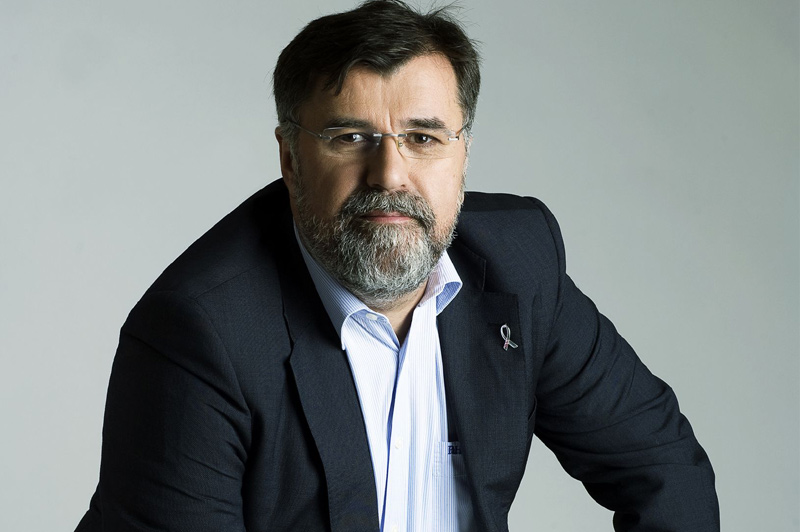Twenty-one years after the disintegration of the former Yugoslavia and twelve years after the end of the Yugoslav Wars, Serbia in 2013 established a commission to look into the deaths of journalists during that period that is now making progress on bringing long-overdue justice to the victims.
Made up of representatives from the journalist community and Serbia’s Ministry of Internal Affairs and its national security body, the Security Information Agency, Commission for the Investigation of Murders of Journalists combines members’ access to information and investigative skills in an effort to end the cycle of violence against journalists.
The Commission’s most successful case to date is its investigation into the 1999 murder of Slavko Ćuruvija, the owner of an influential independent newspaper and a well-known critic of late former president Slobodan Milošević. Ćuruvija wrote numerous articles condemning the Serbian government and was called a traitor and a NATO supporter as a result.
He was shot in the back 17 times by two men outside his apartment building and none of the perpetrators have been held to account – until now. After three years of investigations by teams of journalists, police inspectors and security service representatives, four suspects have been charged. Three have been arrested and one is being tried in absentia while being sought outside the country.
Some of those suspects have also been implicated in two other high-profile murders: the 2001 killing of Vecernje Novosti correspondent Milan Pantić and in the 1994 murder of Duga news magazine reporter Radislava “Dada” Vujasinović.
The founder and chair of the Commission, Serbian journalist Veran Matić, who recently spoke with the International Press Institute (IPI), says that “we expect to make some breakthroughs in the near future in those two cases” as well.
Struggle for accountability
This news is of some relief to journalists who know the struggle of ensuring accountability in Serbia, a process that has been frustratingly drawn out.
Matić is a colleague of those journalists who were brutally murdered. A co-founder of radio station B92, which IPI named a Free Media Pioneer in 1998, his work as an independent journalist led IPI to honour him in 2000 as a World Press Freedom Hero. In recent years, his work also has resulted in the need for him to live under constant police protection.
He says he remembers the empty promises that every newly appointed coalition, government and prime minister made for accountability for the journalists’ deaths, to no avail.
“The matrix was clear,” Matić recounts. “There was no intention to resolve those murders.”
That apparently changed after the Serbian Progressive Party, once a partner to Milošević’s Socialist Party of Serbia, won the parliamentary election in 2012 and appointed Aleksandar Vučić as the new deputy prime minister.
Knowing that Vučić was Serbia’s information minister at the time of Ćuruvija’s murder, Matić approached him in the belief that Vučić would approve the Commission to boost his public image.
“Vučić might benefit from a show of public accountability,” Matić explains. “I thought that for him also finding out the killers and those who ordered those killings was the most constructive way of facing his own flawed past.”
Some sceptics have raised concerns that the government, by supporting the Commission, may be deflecting responsibility. But Matić says he believes that this criticism is unfounded.
“A responsible government will make all the efforts necessary in order to resolve those killings, without trying to avoid its accountability in the process,” he comments. “Unpunished crimes, especially those committed by state institutions, only call for new violence, threats and endangerment of the safety of journalists.”
Government institutions’ role
Government institutions have also played an active role in the Commission, as opposed to merely giving superficial support. While journalist members offer investigative and analytical skills, members from the government and security services provide access to information that journalists would not otherwise be able to acquire.
This dynamic is significant in the cases of Pantić and Vujasinović, which are more difficult due to a lack of documents and information. The death of Vujasinović was initially labelled a suicide after she was found dead in her apartment. However, the case was reopened in 2009 and efforts by the Commission have led to the emergence of further evidence.
Pantić had reported on criminal affairs and corruption in local companies and had received multiple threats prior to his death. The Commission is now working intensely on his case and building a large case file from investigations by seven working groups.
The Commission also is working on a case against NATO over the deaths of 16 Radio Television of Serbia (RTA) staffers killed in a 1999 NATO airstrike targeting RTS’ Belgrade headquarters. It is the Commission’s most difficult case yet, as they are trying to hold accountable not only the pilot who fired a missile into the building, but also top NATO decision-makers who ordered the missile’s launch. So far, NATO has refused to cooperate.
Matić stresses the importance of public recognition to the case, pointing to the lists of journalists killed each year that IPI and other press freedom defenders maintain. He notes that not all groups recognise the RTS staffers as having died in connection with their work and he emphasises that doing so “is important in a symbolic way, so that they are recognised as victims rather than parts of military machinery, as was suggested”.
Despite the challenges it faces, the Commission has earned praise for its investigative work and successes in other cases. It served as a model for a similar commission established in Montenegro in 2013 and it continues to assist its Montenegrin counterpart in their work today.
Matić also initiated the establishment of the International Commission in Kosovo, which is investigating the disappearance of six Serbian reporters and the killings of three Albanian media workers.
